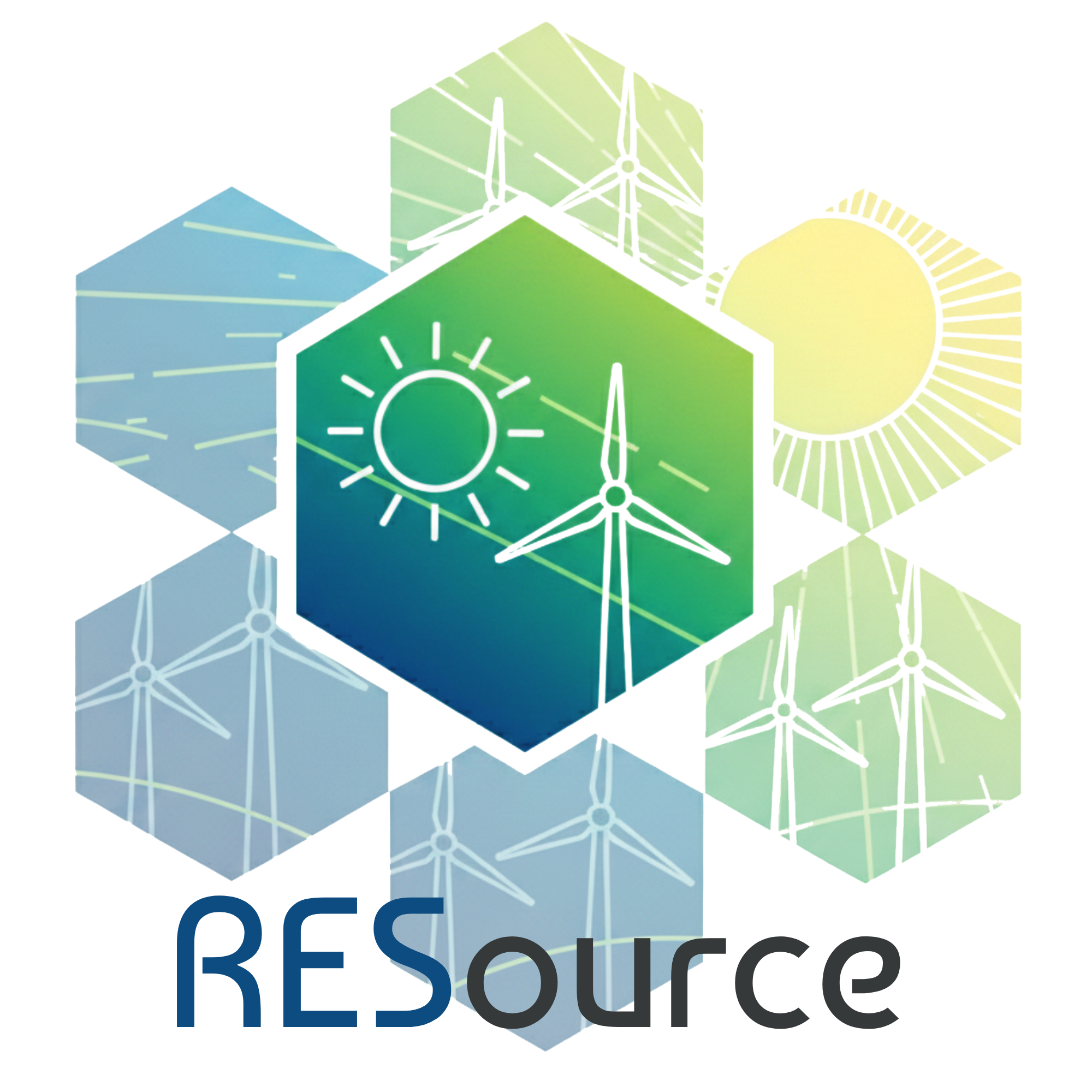RESource Project - Complete Setup & Development Guide#
🎯 Quick Start (New Users)#
Prerequisites#
Python 3.11+
Git
Conda or Miniconda (strongly recommended for better package management)
Linux environment (native Linux, WSL2 on Windows, or macOS)
2. Environment Setup (One Command)#
# Create conda environment with all dependencies
make setup-conda
# Activate environment
conda activate RES
# Test installation
python -c "import RES; print('✅ RESource is ready!')"
🛠️ Environment Management#
Available Make Commands#
Environment Setup & Management#
make setup-conda # Create/update conda environment 'RES'
make conda-status # Check environment health and packages
make clean-conda # Remove conda environment
make export-env # Export environment to env/environment_exported.yml
Running Code#
make run-res # Run main RESource module
make run-conda SCRIPT=path/to/script.py [ARGS='arg1 arg2'] # Run custom scripts
make jupyter # Start Jupyter Lab with conda environment
Documentation#
make docs-build # Build documentation only
make docs-conda # Build and deploy documentation
make deploy # Deploy documentation to GitHub Pages
make sync-notebooks # Sync notebooks to docs
make autobuild # Live rebuild documentation with auto-reload
Utilities#
make help # Show all available commands
make clean-docs # Clean documentation build files
make clean-all # Clean all build files and environments
🐧 Platform-Specific Setup#
Windows Users (WSL2 Required)#
RESource is designed for Linux environments. Windows users must use WSL2:
Install WSL2:
# In PowerShell (as Administrator) wsl --install
Install Ubuntu distribution:
# Check available distributions wsl --list --online # Install Ubuntu (recommended) wsl --install -d Ubuntu-22.04
Install Miniconda in WSL2:
# In WSL2 terminal wget https://repo.anaconda.com/miniconda/Miniconda3-latest-Linux-x86_64.sh bash Miniconda3-latest-Linux-x86_64.sh source ~/.bashrc
Linux/macOS Users#
Install Miniconda directly:
# Linux
wget https://repo.anaconda.com/miniconda/Miniconda3-latest-Linux-x86_64.sh
bash Miniconda3-latest-Linux-x86_64.sh
# macOS
wget https://repo.anaconda.com/miniconda/Miniconda3-latest-MacOSX-x86_64.sh
bash Miniconda3-latest-MacOSX-x86_64.sh
📦 Environment Details#
Core Dependencies#
The env/environment.yml includes:
Scientific Computing:
Python 3.11, NumPy, Pandas, SciPy, XArray
Geospatial:
GeoPandas, Rasterio, Shapely, Fiona, PyProj, Cartopy
Energy Modeling:
Atlite (wind/solar resource assessment)
CDS API (climate data)
Visualization:
Matplotlib, Seaborn, Plotly, Folium
Development:
Jupyter Lab, Sphinx (documentation), pytest
Full list: See env/environment.yml for complete dependency specification.
🚀 Daily Development Workflow#
1. Activate Environment#
conda activate RES
# Your prompt should show: (RES) $
2. Run RESource#
# Main module
make run-res
# Custom scripts
make run-conda SCRIPT=workflow/scripts/your_script.py
# Interactive development
make jupyter
3. Documentation Development#
# Live rebuild (recommended for doc development)
make autobuild
# Opens http://localhost:8000 with auto-reload
# Build only
make docs-build
🔧 Troubleshooting#
Environment Issues#
Problem: Double environment prompts (RES) (base) $
# Solution: Disable auto-activation of base
conda config --set auto_activate_base false
source ~/.bashrc
Problem: "Environment 'RES' not found"
# Solution: Recreate environment
make clean-conda
make setup-conda
Problem: Package conflicts or broken environment
# Solution: Clean rebuild
make clean-conda
conda clean --all
make setup-conda
Problem: Import errors for pandas/geopandas after atlite installation
# Solution: Reinstall conflicting packages through conda
conda activate RES
conda update pandas geopandas
# Or clean reinstall:
make clean-conda && make setup-conda
Problem: Local package not updating after code changes
# Solution: Reinstall in development mode
conda activate RES
pip install -e .
Check Environment Health#
make conda-status
# Shows: environment status, Python version, key packages, RESource module availability
Export Current Environment#
make export-env
# Creates env/environment_exported.yml with exact versions
WSL2 Specific Issues#
Problem: Conda commands not found in WSL2
# Solution: Ensure conda is in PATH
echo 'export PATH="$HOME/miniconda3/bin:$PATH"' >> ~/.bashrc
source ~/.bashrc
Problem: Permission issues in WSL2
# Solution: Fix file permissions
sudo chown -R $USER:$USER /path/to/RESource
📋 Development Checklist#
New Developer Setup#
[ ] Clone repository:
git clone https://github.com/DeltaE/RESource.git[ ] Install Conda/Miniconda
[ ] Run
make setup-conda[ ] Test:
python -c "import RES; print('✅ RESource is ready!')"[ ] Test Jupyter:
make jupyter
Before Committing Code#
[ ] Environment is clean:
make conda-status[ ] Code runs:
make run-res[ ] Documentation builds:
make docs-build[ ] Export environment if dependencies changed:
make export-env
Before Deployment#
[ ] Documentation is current:
make docs-conda[ ] All notebooks sync:
make sync-notebooks[ ] Environment is exportable:
make export-env
🌐 Documentation Deployment#
Local Development#
# Live reload during development
make autobuild
# Visit: http://localhost:8000
GitHub Pages Deployment#
# Build and deploy to GitHub Pages
make deploy
# Visit: https://deltae.github.io/RESource/
Documentation Structure#
docs/
├── source/ # Source files
│ ├── index.md # Main page
│ ├── notes/ # Documentation pages
│ └── notebooks/ # Jupyter notebooks
└── build/ # Generated HTML (auto-created)
💡 Tips & Best Practices#
Environment Management#
Always use
make setup-condainstead of manual conda commandsKeep
env/environment.ymlupdated when adding dependenciesUse
make export-envto document exact working environmentUse
make conda-statusto check environment health regularly
Development#
Use
make run-conda SCRIPT=...for testing scripts with proper environmentUse
make jupyterfor interactive development (ensures correct kernel)Use
make autobuildfor documentation development with live reload
Collaboration#
Always commit updated
env/environment.ymlwhen dependencies changeUse
make export-envto share exact working environmentDocument any platform-specific setup requirements
🆘 Getting Help#
Check Status#
make conda-status # Environment health check
make help # Show all available commands
Common Issues#
Import errors: Usually environment not activated or packages missing
Jupyter kernel issues: Use
make jupyterinstead of direct jupyter commandsDocumentation build fails: Check Sphinx dependencies with
make conda-statusPlatform issues on Windows: Ensure using WSL2, not native Windows
Resources#
This guide covers the complete setup and development workflow for RESource. All commands are tested and maintained through the project Makefile.
